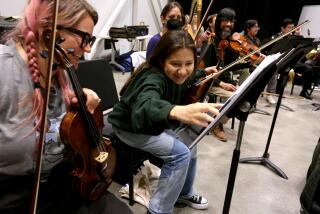MUSIC REVIEW : Robison, Fisk: Technically Solid Duo
- Share via
A lot of notes left the stage, many of them in a hurry, Wednesday at the Irvine Barclay Theatre. Few had the expressive impact, however, of Falla’s quiet, simple “Asturiana,” with the lyric lift of Paula Robison’s beautifully sustained flute floating over the mobile accompaniment of Eliot Fisk’s guitar.
Opening the season for the Orange County Philharmonic Society, on its Festival series at the Irvine venue, Robison and Fisk dispatched a lightweight, though frequently difficult, program with easy brio.
When their technical resources were not challenged, however, the duo veered between interpretive overkill and blunt, multipurpose perkiness, as in the other six of Falla’s often rearranged folk-song settings.
The accompaniments transfer nicely to the guitar, as Fisk proved with his idiomatic and provocative adaptations. But instruments taking over the voice part are usually literally at a loss for words, as Robison demonstrated in stammering the repeated notes of the “Seguidilla Murciana” without pertinent stress or in introducing too much tempo fluctuation too soon in the “Jota.”
Fisk’s arrangement of Haydn’s “London” Trio No. 1 also found the pair in a brisk mode of undifferentiated geniality. The dominance of heavy, buzzing bass in Fisk’s playing left little sense of the melodic imitation that should characterize much of the work.
The forceful personality of the duo had more purposeful expression in works originally written for their instruments. George Rochberg’s “Muse of Fire” was composed for them on a Carnegie Hall Centennial commission. Cast in one large, episodic movement, it gathers emotional vehemence around a a lyric central section based on an ecstatic paraphrase of “Amazing Grace.”
Virtuosity also had ample room for play in Astor Piazzolla’s “Histoire du Tango,” four stylistically progressive interpretations of the dance. A greater feeling of both the sensuality and the cynicism of the “Cafe 1930” movement is possible, but for sheer motor energy this was a matchless performance.
Each of the musicians turned to the Baroque for solo spots. Fisk arranged four transcriptions from Sylvius Leopold Weiss into a little suite, and delivered it with style-conscious vigor. Robison displayed her nimble articulation, purity of tone and breath control in bland miniatures from Jacques Hotteterre and Telemann.
In encore, they offered the small crowd of happy clappers a high-voltage dash through Ibert’s perennial “Entr’Acte” and a gracefully hushed account of Casals’ “Song of the Birds” arrangement.
More to Read
The biggest entertainment stories
Get our big stories about Hollywood, film, television, music, arts, culture and more right in your inbox as soon as they publish.
You may occasionally receive promotional content from the Los Angeles Times.










